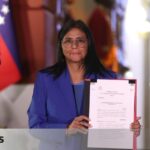
Restrictions range from bulletproof vests to airplane parts. Top export destinations for some banned materials in recent months have included the US and Israel.
Beijing on Thursday announced export controls on several military-related materials and tools.
Restricted items include equipment used to manufacture aerospace parts and engines, gas turbines – which can be used in warships and tanks – as well as key components for bulletproof vests.
The rules come into effect on July 1 and equipment, software and technology affected by the ban will not be able to be exported without authorization, according to a statement jointly released by the Ministry of Commerce, General Administration of Customs and Military Commission Equipment Development Department Central.
“This is to safeguard national security and interests and comply with international obligations such as non-proliferation,” according to a statement from the commerce ministry.
Beijing’s rare move comes amid rising tensions over technology and trade with the United States, as well as growing pressure from the West to stop supporting Russia’s war with Ukraine.
Since the start of the war, many Chinese entities have been sanctioned by the US for their alleged support of Russia, including the export of equipment that has both civilian and military uses.
US Secretary of State Antony Blinken said last week that the White House would work with the European Union to sanction Chinese companies that supply Russia with microelectronics and high-tech products that support the country’s defense industry.
Beijing has repeatedly denied supplying weapons to Russia.
According to China customs data, the US, Vietnam and Singapore were the three largest importers of Chinese aerospace products specified in the list in the first four months of the year.
The US, India and Vietnam were the three largest importers of gas turbine-related restricted goods in the same period. Gas turbines can be used on warships and large vehicles such as tanks.
The restrictions also cover ultra-high molecular weight polyethylene fibers, which can be used in protective equipment such as bulletproof helmets, bulletproof vests, bulletproof inserts and bulletproof plates.
The main export destinations for this material between January and April were Brazil, Vietnam, USA and Israel.
There are also restrictions on molds designed to make spacesuit visors, which will likely affect countries such as Mexico, the US and Vietnam.
“The relevant policies do not target any specific country or region,” the Ministry of Commerce said.
“The Chinese government firmly safeguards world peace and stability in surrounding areas, ensures the security of global industrial and supply chains, and promotes the development of trade accordingly.
“At the same time, we oppose any country or region that uses China-controlled items to engage in activities that harm China’s national sovereignty, security and development interests.”
Exporters will need to submit their contact details and technical descriptions or test reports on export items, as well as provide trade authorities with details on the importers and end-users of their products.
The export of items that have a significant impact on national security will be submitted to the State Council for final approval.
The restrictions are the first of their kind since last September’s restrictions on the export of drones that could have military applications.
Thanks to its vast manufacturing capacity, China dominates the supply chain for many materials that could be critical for military production, while the US and EU have also expressed growing concerns about their “over-dependence” on Chinese manufacturing.
Earlier this year, some senior European figures, including EU internal markets commissioner Thierry Breton, said the bloc was unable to supply enough weapons to Ukraine because China was not supplying enough nitrocellulose, which is used to produce artillery ammunition.
Armin Papperger, chief executive of Rheinmetall, a major ammunition producer based in Germany, told the Financial Times in April that Europe depended on China for “more than 70 percent” of its cotton fibers – the main raw material to make nitrocellulose.
Lu Xiang, a senior researcher at the Chinese Academy of Social Sciences who specializes in US studies, said that “as this export control order was formulated and issued with the participation of the Central Military Commission, it means that the relevant control measures are for military items or dual-use items.”
He said the measures were not specifically targeted but were designed to prevent the proliferation of military aviation and aerospace components.
“Especially in terms of preventing militarization in space, this control order shows the clear attitude of the Chinese government,” he said.
He stated that the recipients and end uses of restricted products would be reviewed “in accordance with international practice,” adding: “I understand that this control order will not affect legitimate applications in non-military fields.”
Lu Wei, a consultant at China’s public security guard training center, which focuses on anti-terrorism work, also said the ban was not targeting specific countries.
He said there was “no special meaning” behind the measures, which were designed to establish a licensing system and prioritize support for central and state-owned enterprises.
“Licensing will only be given to central or state-owned companies… If private or foreign companies want to participate, they will have to work with central state-owned companies,” he said.
Via South China Morning Post.
Source: https://www.ocafezinho.com/2024/05/31/china-restringe-exportacoes-de-materiais-militares/

